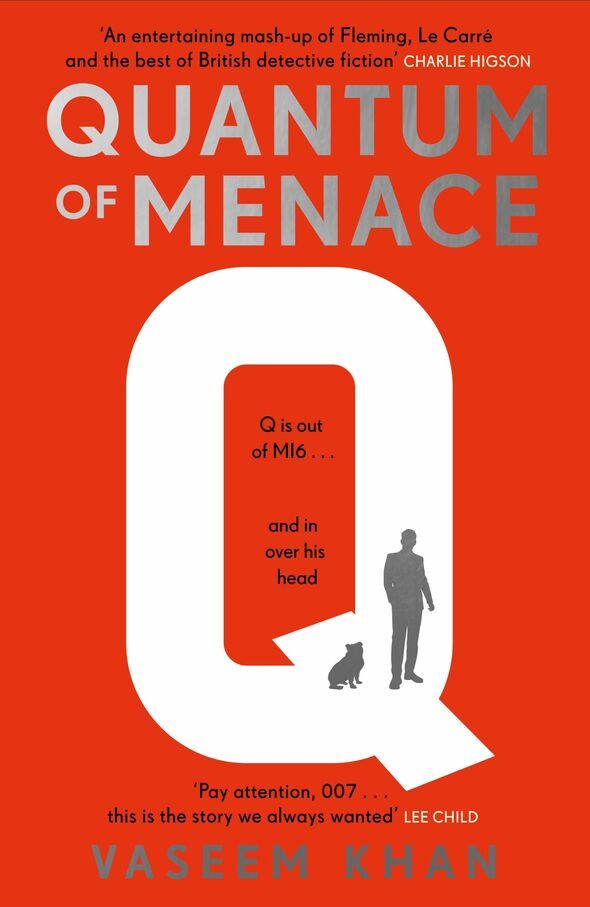

It is a brand new James Bond series, but not as readers know it. While Vaseem Khan's first Bond novel, Quantum of Menace, does feature the famous tuxedoed secret agent, his sole mission this time is as a side character through the amused, analytical eyes of another man - Q, MI6's eccentric quartermaster who usually arms 007 with gadgets and engages him in witty asides.
Commissioned by the powerful Ian Fleming Estate, the second in the series is already at draft stage and if sales are strong, more will follow. At first glance, the invitation from the trustees and descendents of the James Bond creator, via its publishing arm, could have been the ultimate dream gig. But Vaseem, 51, knew there were traps embedded within the opportunity.
The character of Q carries fan loyalties that are split sharply between actor Desmond Llewellyn's avuncular traditionalist and more recently, actor Ben Whishaw's younger, tech-savvy successor in the Bond movie franchise. To tamper recklessly with such an iconic character could end in disaster.
Vaseem's solution was bold - and conditional. He said he would accept the challenge only if he could reimagine Q. After all, in Ian Fleming's own novels, the much-loved character barely appears, with most of his mythology coming from the big screen interpretations.
"The character of Q is iconic, and people are wedded to Llewellyn or Wishaw. I didn't want to make a mess of that, so I agreed on the condition that I was allowed to invent Q practically from scratch," he explains. The estate agreed, giving Vaseem extraordinary creative latitude.
"They said, 'Crack on'. And so, my Q is somewhere in between the two screen depictions, because I didn't want to be lynched by fans of either, basically. And the Estate has been wonderful, and has left me alone. The plot is my own; even the title is my own. I produced a few plot ideas and this was the one they liked."
In it, gadget master becomes hero - we first meet him later in life, aged 50, having been abruptly cast out of a futuristic version of MI6, his brilliance out of step with the bureaucrats now running the show. It's an audacious twist worthy of Ian Fleming's legacy. "He's got bits of Llewellyn, but he's also in tune with the new cyber security world. He believes in technology the way that fish believe in water," he explains.
"However, he's also a man at sea because he's essentially been booted out of MI6 under bad grace. He's got no family to fall back on and so he finds himself, after nearly three decades, locked away in his lab, helping the double O's fight supervillains and trying to secure democracy. And that's what leads him to the events that happen in the book," adds Vaseem who was first and foremost a management consultant before he started writing prize-winning novels in the "cosy crime" genre.

For 20 years under his consultancy colours, Vaseem has worked at University College London where he helped to establish a PhD training centre in Security Science known as UCL SECReT. The first of its kind in Europe, its brilliant alumni have worked on topics including landmine detection, terrorism, forensics and cyber security, and this gives every line of his reimagined spy world an unnerving plausibility.
When he writes about AI destabilizing democracies or quantum computers being put to nefarious uses, it's not just thriller plot dressing - these are real-world possibilities discussed in UCL labs by real boffins. And Vaseem is, naturally, a huge Bond fan.
Underpinning the new Bondverse he has created are his remembered film nights with his parents, watching Roger Moore swagger across the screen while his mother tried to shield him from the sort of sultry love scenes popular in the Seventies. "My Dad absolutely adored Roger Moore, and probably saw himself as a bit of a Bond as so many of us do," he recalls fondly. "But my mother would make me change the channel because she thought it might corrupt my teenage brain."
Both his parents have since passed away, making those film nights bittersweet in recollection. "I have very warm memories of that," he admits. The Q of Quantum of Menace is a man adrift after being ignominiously pushed out of MI6 for challenging the new head of the service, M, in a public hearing about the dangers of artificial intelligence - and making her look uninformed.
"Q is usually the smartest person in the room, but like so many clever people he is unfortunately surrounded by more powerful people most of the time, in his case government ministers, politicians and their oversight committees. Their tendency is rarely to listen to good advice at a time when it might be of some use." explains Vaseem.
Now, Q is reduced to navigating life outside MI6 in a small town far removed from the world of intelligence. Although the Bond universe usually plays out on a global stage, Quantum of Menace scales things down. From county lines drug trafficking to migration debates splitting neighbours, the local setting allows Vaseem to turn Q's gaze onto issues Britain grapples with right now.
"It's a state-of-the-nation novel disguised as a clever, cosy crime mystery, in the vein of Mick Herron's Slow Horses blended with Richard Osman's Thursday Murder Club," says Vaseem, whose prose crackles with authenticity thanks to his real-world knowledge from his two decades spent at UCL. He continues to maintain a relationship with UCL's Dawes Centre for Future Crime, which focuses on key questions such as 'How can we mitigate future threats?'.

"It's very useful for writing crime," he laughs. "My brilliant colleagues are always working on something fascinating, and we joke that they've got the hard work and I get to swan about talking about it. I'm incredibly proud of them because it is a difficult job, not just coming up with science but finding funding for science."
He's fond of the analogy that science can seem like magic to those not immersed in it, which is part of why governments are often slow to act. Politicians with arts backgrounds might lack the grounding to grasp how swiftly technology is advancing.
"Scientists are often the smartest person in the room, but are frequently ignored by those with more power," he points out. "So, although I wanted these to be traditional mysteries, books for people who might enjoy a spy canvas, they will also appeal to people who are really here for the intellectual challenge."
Vaseem's own journey into the field of crime and security was unexpected. Born and raised in Britain, he spent a decade in India during his twenties, setting up eco-hotels. His return to the UK was prompted by his mother's cancer diagnosis, and with it came the career pivot to academia.
But outside the office, Vaseem was nurturing literary ambitions. Over twenty years, he wrote and submitted seven novels - all rejected - before finally breaking through at age 40 with Midnight at Malabar House, set in 1950s India. He says it was that series, with its period detail and dry humour, that caught the Fleming Estate's eye when they were looking for an author.
Vaseem's credibility was further strengthened when the series won the coveted Historical Dagger from the auspicious Crime Writers' Association (CWA). Several years later, Vaseem was invited to serve as the CWA's chair - the first non-white writer to do so in its 70-year history. He approached the role as an opportunity to give back to an industry he'd battled to enter, after collecting roughly 150 rejection letters in his earlier career.
"It's a tough industry," he says. "Crime fiction is flourishing, but writers still need community, support and advocacy."
Vaseem resists framing his achievements in terms of his Anglo-Indian heritage. While headlines understandably note these milestones, he sees himself first and foremost as "the right writer for the job".

Having lived and worked in cultures from India to China, and having researched in small-town America, he believes humanity's common sense and goodness outweigh its divisions. That belief permeates Quantum of Menace; for all of Q's cynicism and wit, the underlying tone is one of faith that decency will ultimately prevail.
It would be easy to see the simply as a commercially bulletproof assignment - the Bond brand sells itself. Yet Vaseem treated it as an honour laced with responsibility, and no little fun - evident in Q's dry, cutting observations, in the satirical flashes about political shortsightedness, and in meticulous integrations of technology's potential dangers.
By the end of his first outing, Vaseem has established Q as more than the sum of his gadgets, reframing him as both an engaging protagonist and a lens through which to view a fraught modern Britain and all while never losing sight of the thrill sparked by a tuxedoed hero with a shaken Martini. And without ever losing sight of his essential decency.
"If there is one thing I hope people take away from the book is that goodness will prevail over everything else," he says wistfully.
As much as his mother might have tutted at the screen all those years ago, one imagines she would be proud of her son bringing Bond's world to life by focusing on the sort of quiet heroism that rarely makes the headlines.
